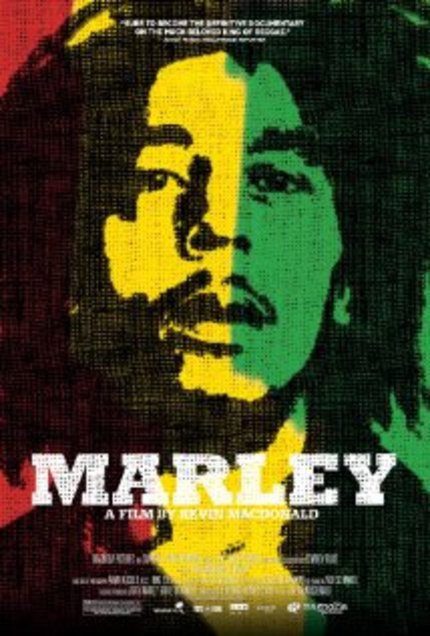Review: MARLEY Doc Gets Up, Stands Up

Even as his greatest hits collection "Legend" ranks among the best selling albums of all time, Marley nevertheless has been culturally boiled down to an icon, more a t-shirt image than a man. From Hendrix to Lennon to Cobain, we've seen that happen to numerous popular musicians who suffer premature death. The difference with the rock stars listed is that they are played on the radio; Marley is generally not. (In my town, people think "I Shot the Sherriff" is an Eric Clapton song.) Hence, he's become the focus of a cultural infatuation - a cool mon from Jamaica, with the dreads and the ganja and "Buffalo Soldier" and rarely anything more. Macdonald stirs it up as his film cuts through the conflated to look and listen to the conflicted and convicted heart of the man himself. Like the reggae music he made and popularized the world over, occasionally it beats like a cheap lawn sprinkler, but more often, it beats deep and true, ever lingering in the zeitgeist.
Although MARLEY doesn't defy the established conventions of the rock doc (comprehensive talking head interviews intercut with music, chronologically detailing the subject) it is ultimately moving and satisfying enough to be considered the definitive filmic word on the artist. We hear from members of Marley's band The Wailers, controversial label execs, friends, and most movingly, family. Despite the vivid backdrop of harsh political unrest in Jamaica (where Marley, having ascended to near deification, was looked to for the answers, and subsequently fled) and the waft of perpetual smoke the man inhaled religiously, MARLEY stands up as an approachable and coherent musician's story. We see all sides: Marley the prolific songwriter, Marley the devout Rastafarian (a faith that is defined if not espoused here), Marley the celebrity, Marley the philanderer, Marley the Christ figure/mediator, and Marley the tragic absentee father.
Macdonald's depth of presented archival footage (including lots of live performances) is beyond impressive; it is perhaps a case study for anyone considering taking on such a film project in the future. (Macdonald came to the gestating project through a revolving door of name directors, including Martin Scorsese and Jonathan Demme, both of whom had to walk away.)
Along the admitted long road that the film travels, all the hits (and then some) are sampled, although never in a glaring or obtrusive manner. They texture the story like bona fide source music cues (music that physically plays in the world of the film), even as they merely play over carefully selected moments and sound bites. When properly approached as an immersive theatrical experience, MARLEY moves in a subtly powerful way. The epic 144 minute running time will challenge bladders more than patience, as you'll not only be jonesing for the man's music, you'll be feeling that Bob Marley is the ideal subject of a global and decades-spanning project such as this. Don't worry about a thing, because every little thing is all right with MARLEY.
- Jim Tudor

Do you feel this content is inappropriate or infringes upon your rights? Click here to report it, or see our DMCA policy.






